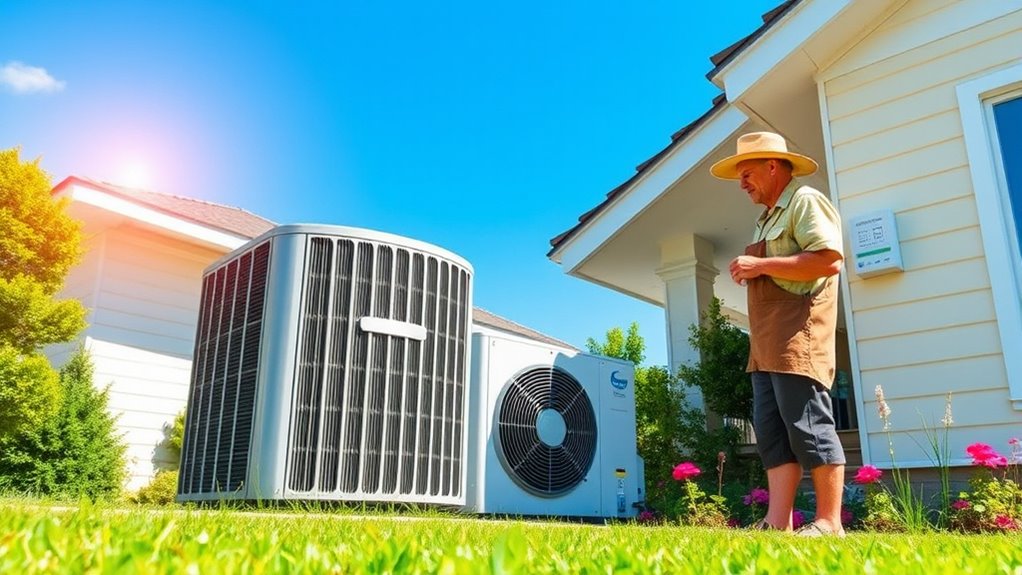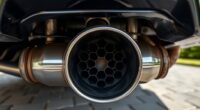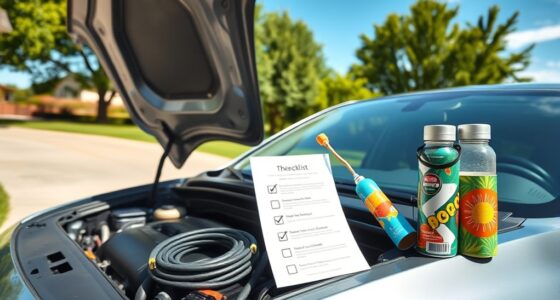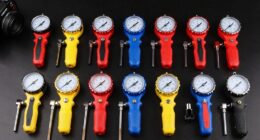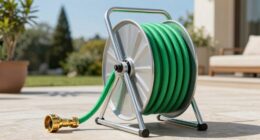To keep your cooling system running smoothly during summer heat, confirm your refrigerant levels are adequate and address any leaks promptly, as low refrigerant reduces cooling efficiency. Keep ducts clean to avoid airflow blockages and prevent your system from overworking. Regularly replace filters and remove debris from outdoor units to maintain proper heat dissipation. Proper maintenance helps prevent breakdowns and lowers energy costs—learn more tips to keep your system in top shape during the hottest months.
Key Takeaways
- Regularly check and recharge refrigerant to maintain optimal cooling efficiency during peak heat.
- Schedule professional duct cleaning to ensure unobstructed airflow and consistent indoor temperatures.
- Replace or clean filters monthly to improve airflow and reduce system strain in hot weather.
- Keep outdoor units free of debris and well-maintained for effective heat dissipation.
- Promptly address refrigerant leaks and system issues to prevent damage and ensure reliable cooling.
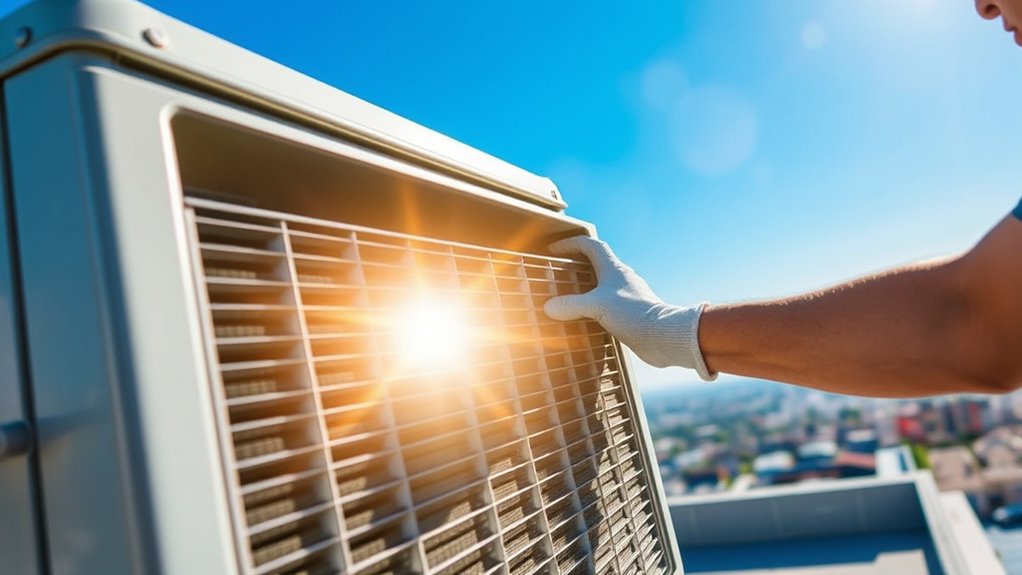
As summer heat intensifies, maintaining your cooling system becomes more important than ever. When the temperature rises, your AC has to work harder to keep your home comfortable. If you notice it’s struggling to cool your space efficiently, it might be time to contemplate a refrigerant recharge. Low refrigerant levels can cause your system to run longer and less effectively, leading to higher energy bills and increased wear on your unit. Recharging the refrigerant is a straightforward process that guarantees your system has the right amount of coolant to absorb heat and cool the air properly. Don’t ignore signs like inconsistent temperatures or a hissing sound near the indoor unit, which could indicate refrigerant leaks. Addressing these issues promptly keeps your system running smoothly and prevents costly repairs down the line.
In addition to refrigerant levels, duct cleaning plays a crucial role in maintaining peak cooling performance. Over time, dust, dirt, and debris accumulate inside your ductwork, obstructing airflow and reducing efficiency. When ducts are clogged, your AC has to work harder to circulate cool air, which strains the compressor and increases energy consumption. Regular duct cleaning ensures unobstructed airflow, helping your system operate at maximum efficiency. It also improves indoor air quality by removing allergens and pollutants that can settle in the ducts. During the hot summer months, having clean ducts means your home cools evenly and quickly, avoiding hot spots and uneven temperatures. Scheduling professional duct cleaning before the peak of summer can make a significant difference in comfort levels and energy savings.
Beyond refrigerant recharge and duct cleaning, you should also keep an eye on your air filters. Dirty filters restrict airflow and reduce your system’s ability to cool effectively. Replacing filters every month during the summer ensures proper airflow and improves indoor air quality. Additionally, check that your outdoor unit is free of debris, such as leaves or grass, that could block airflow or cause overheating. Ensuring your outdoor unit is clear and well-maintained helps it dissipate heat efficiently, especially during the hottest days. Moreover, using a best free keto diet app can help you monitor your overall home energy efficiency and identify areas for improvement, leading to better cooling performance and lower energy costs.

ZeroR AC Recharge Kit R134a Replacement – Eco-Friendly Refrigerant Gas with 24-Inch Charging Hose Tool for SSV Cans, 2-Pack
IMPORTANT! – (1) Verify that you have an R134a system before purchasing! Do not rely on amazon data…
As an affiliate, we earn on qualifying purchases.
As an affiliate, we earn on qualifying purchases.
Frequently Asked Questions
How Often Should I Replace My Air Filters During Summer?
You should replace your air filter every 1 to 3 months during summer to maintain ideal airflow and indoor air quality. Following a regular maintenance schedule helps prevent dust buildup and keeps your cooling system efficient. If you have pets or allergies, consider changing filters more frequently. Check your filter monthly, especially during high usage, to make sure it’s clean and functioning properly, which ultimately prolongs your system’s lifespan.
Can Outdoor Units Be Affected by Nearby Plants or Debris?
Yes, outdoor units can be affected by nearby plants or debris. Plant interference can block airflow, reducing efficiency, while debris buildup around the unit can cause it to overheat or work harder. To prevent this, you should regularly trim back plants and clear away leaves, dirt, and clutter. Keeping the area around your outdoor unit clean guarantees maximum airflow, helping your cooling system run smoothly and efficiently throughout the summer.
Is It Necessary to Upgrade My System for Extreme Heat Conditions?
When the summer sun blazes fiercely, your cooling system may need an upgrade to handle the extreme heat. You might consider increasing your system capacity to keep up with soaring temperatures and improve energy efficiency. Imagine your current unit struggling like a fan in a hurricane—upgrading ensures it can breeze through even the hottest days, maintaining comfort without skyrocketing energy bills. Upgrading now keeps your home cool and efficient during relentless summer heat.
How Do I Identify Early Signs of Cooling System Failure?
You can identify early signs of cooling system failure by paying attention to system noise and refrigerant leaks. If your unit starts making strange noises or if you notice hissing or bubbling sounds, it’s a sign to check for leaks or other issues. Additionally, if your system isn’t cooling effectively or you see ice buildup, these are indicators that your system needs professional attention before more serious damage occurs.
What Is the Best Time of Day to Schedule Maintenance?
Imagine your cooling system as a car engine; you wouldn’t wait until it stalls to get an oil change. The best time for maintenance timing is early morning or late evening when temperatures are cooler, ensuring ideal scheduling. This prevents system overload during peak heat, keeps your system efficient, and extends its lifespan. Regular maintenance at these times helps you avoid costly repairs and keeps your home comfortably cool.

Flexible 8 Tentacles Air Duct Cleaning Whip, Forward Air Flow Design, 14 Inch Long for Duct Cleaning with 1/8 Inch Connector
DESIGN: 8 flexible tentacle whips designed specifically for air duct cleaning, with 14-inch length for effective reach and…
As an affiliate, we earn on qualifying purchases.
As an affiliate, we earn on qualifying purchases.
Conclusion
Keeping your cooling system maintained in summer is like tending a garden—you need to give it regular care to guarantee it blooms efficiently. By checking filters, cleaning coils, and scheduling professional tune-ups, you prevent breakdowns and stay cool when the heat is on. Think of your system as a trusted friend—nurture it now, and it’ll be there to keep you comfortable all season long. Stay proactive, and summer won’t catch you off guard.

Amazon Basics 16x20x1 Air Filter 6-Pack, MERV 8 AC Furnace Filters, Allergy Control, Removes Dust, Lint and Pollen, Electrostatic (Actual Size: 15.75" x 19.75" x 0.75")
ENHANCED AIR QUALITY: Merv 8 rating air filters effectively captures household irritants like lint, dust, and pollen, to…
As an affiliate, we earn on qualifying purchases.
As an affiliate, we earn on qualifying purchases.

MODERN WAVE Central Air Conditioner Cover for Outside Units 36 x 36 – Top Universal Outdoor AC Cover Defender (Mesh, 36" x 36")
PREMIUM AIR CONDITIONER COVER – AC cover provides top protection from leaves and branches
As an affiliate, we earn on qualifying purchases.
As an affiliate, we earn on qualifying purchases.
